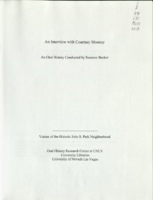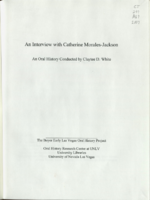Search the Special Collections and Archives Portal
Search Results

Transcript of interview with Ralph Denton by K.J. Evans, approximately 1999-2000
Date
Archival Collection
Description
On an unknown date (likely 1999-2000) and time, K.J. Evans interviewed Ralph Denton, an adviser to former Governor Grant Sawyer and political figure in Nevada for many years. Denton first talks about his personal friendship with Sawyer, their education in law school, and his eventual work on campaigning for and working with Sawyer after he became governor. Denton then explains the controversy regarding Denton’s accepting of complimentary services (comps) at hotels. He later describes his work as a Clark County Commissioner and then talks about working as district attorney in Esmeralda County, Nevada. Denton then talks about the influences that led him to be interested in a career of law and later speaks more about working with Grant Sawyer, specifically about serving as his adviser, afterwards providing the argument on why he believes Sawyer was the greatest governor of Nevada. Toward the latter part of the interview, Denton describes his work on improving civil rights and some of the challenges that came with that. The two also discuss how the practice of law has changed over time. To conclude the interview, Denton describes his experience in running for governor and how he would have served as governor if he had been elected.
Text

Transcript of interview with Betty Ham Dokter by Roger Jablonski, February 27, 1977
Date
Archival Collection
Description
On February 27, 1977, Roger Jablonski interviewed Betty Ham Dokter (born 1922 in Las Vegas, Nevada) about her life in Southern Nevada. Dokter first talks about her upbringing and education in Las Vegas before describing church activity and the first casino properties that were built. She later talks about presidential visits, economic changes in Nevada, the construction of Hoover Dam, and some of the social changes in Las Vegas. The latter part of the interview covers the topics of racial minorities, environmental changes, early grocery stores and movie theaters, and social clubs. The interview concludes with a brief discussion on Mt. Charleston.
Text

Transcript of interview with Courtney Mooney by Suzanne Becker, July 30, 2007
Date
Archival Collection
Description
Courtney Mooney is the Urban Design Coordinator for the City of Las Vegas. Her job description includes a knowledge of historic preservation, which is her passion. In this interview she shares her professional and personal thoughts about John S. Park Neighborhood. She moved to John S. Park in 2002. As a professional she explains that "how I look at preserving neighborhoods or buildings, is more of a community preservation, not saving the individual building for the individual building's sake..." Courtney offers a big picture of the neighborhood's past, present and future. John S. Park, like so many other Las Vegas neighborhoods, was built during World War II and has been affected by history of segregation and the wave of changing demographics, and the work that went into the plan and requirements to be designated a historic neighborhood. Courtney provides a summary of the story about the land, its ownership and what lead to the foundation of the neighborhood: from John S. Park to George Franklin and John Law, to Mary Dutton and explains how the proposed development of the land differed from other communities being built to FHA standards and specifics that declared Las Vegas a Defense City in the 1940s. She lists the factors that made the neighborhood a logical and important target for the historic designation, a small neighborhood tucked away, that is "a snapshot of the types of people that were coming here," filled with community leaders, entrepreneurs, blue-collar and casino workers. She also mentions about the missed opportunity of the Las Vegas High School neighborhood for preservation while supporting the John S. Park designation.
Text

Transcript of interview with Cathy Morales-Jackson by Claytee White, May 5, 2010
Date
Archival Collection
Description
Catherine (Cathy) Morales-Jackson grew up in the suburban tranquility of Hazlet, New Jersey, with five siblings, a stay-at-home mom and her father, who served the community as mayor and as a school board member. In 1981, "on the day Princess Diana go married," Cathy moved to Las Vegas with her boyfriend/future husband and her mother-in-law. Life in Las Vegas was distinctively different than living in New Jersey she explains. For the next 15 years, they lived at Delta Gardens apartments on Paradise. She started working at UNLV's library as it was moving into a new building. He first position was in the periodicals and microfilm area and in binding. She contrasts both details of the campus and the city then with how it is today. At the time of this interview, Cathy was taking an early retirement at the age of 51. She provides a retrospective of a range of library topics: from the thousands of volumes she bound to the move to Lied Library, from a Celebrity Pancake fundraiser to staff parties, and from the implementation of a campus parking fee to the various library organizations that she has belonged to over the years. Cathy loved her years in the university libraries and feels that the current budget crises is the biggest change she has witnessed. Retirement came at an opportune time for her, but she worries about the future for others.
Text

Transcript of interview with Robert & Patricia Campbell by Stefani Evans, November 28, 2017 & March 1, 2018
Date
Archival Collection
Description
In 1976, when Bob Campbell accepted the city manager position in Henderson, Nevada, he and his family had just endured nearly a month of sub-zero temperatures in their native Missouri. Southern Nevada's mild winter coupled with the promise of developing the 8,600 acres that would become Green Valley convinced Bob and his wife, Pat, to make the move. Bob came to Henderson with a degree in public administration and city manager experience in two Missouri towns, but Green Valley offered something akin to "an artist having a blank canvas on which to plan and create." In this interview, Bob talks about the ways his career in public administration blossomed in Southern Nevada. After about five years with the City of Henderson, Campbell joined Mark Fine and American Nevada Corporation to develop Green Valley; five years after that, he moved to Southwest Gas Corporation to work with Bill Laub and later, Kenny Guinn. From about 1989 to 1997, he helped develop Lake Las Vegas. In 1994, Bob and Pat together formed The Campbell Company, a private consulting firm whose clients included Transcontinental Properties' Lake Las Vegas project as well as Henry Chen's Ascaya. v Much of the interview focuses on the Lake Las Vegas project: its original visionary, false starts, and its tumultuous development as an arm of the Bass brothers of Fort Worth, Texas; their developer, Ronald Boeddeker of Transcontinental Properties in Santa Barbara, California, and Boeddeker's appointee, Alton Jones. Along the way Campbell shares the strategies employed by the Wednesday morning group of Henderson boosters who met at Saint Peter's Catholic Church and who succeeded in gaining the necessary local, state, and federal approvals to move the project forward. He reveals the intimidation, physical threats, and sexual harassment suffered by those who questioned the way Jones did business. Overall, though, he explains why he continues to respect the Bass brothers and is still proud of Lake Las Vegas, "proud that we got it on, and proud that it's turned out to be what it is."
Text

Transcript of interview with Neil Henry Holmes by James Greene, January 14, 1975
Date
Archival Collection
Description
On January 14, 1975, collector James Greene interviewed foreman, Neil H. Holmes (born on November 16th, 1897, in Chicopee, Kansas) in his home in Boulder City, Nevada. This interview covers the early days in Boulder City. Mr. Holmes also discusses the local education system, family life, employment opportunities, housing, and the building of Hoover Dam.
Text

Transcript from interview with Mike Unger by Barbara Tabach, January 21, 2016
Date
Archival Collection
Description
In this interview, Unger reflects upon his long and successful career in hotel management in Las Vegas and also in Arizona and Pennsylvania. He shares stories as a local celebrity, particularly in the 1970s and 1980s when he worked at Caesars Palace, as well as the big projects he oversaw, including organizing the first big fight nights, World Series of Tavern Poker and Grand Prix race. He talks about working with Morris Shenker, Moe Dalitz, Cliff Perlman and Billy Weinberger, and the role of the Jewish community in the city, and specifically in the gaming industry. Unger also discusses his non-gaming industry ventures which have included a satellite communications business and a bagel business.
Mike Unger was born in Queens, New York in 1947, and spent most of his childhood in Long Island, growing up in a predominantly Jewish and Italian community. As a young adult, Unger was already working hard, running one of his family?s restaurant after school. When he was in high school, his family moved to Los Angeles to accommodate his father?s health needs, and eventually end up in Las Vegas by 1967. Over the next two decades, Unger would work at nine properties in the city. Unger is one of the University of Nevada, Las Vegas? first hotel management graduates, and started his career with Summa Corporation in its management training program at the Frontier Hotel and Casino. After a brief stint at the Airport Marina Hotel in Los Angeles in 1972, Unger returned to Las Vegas, serving in management capacities at the Aladdin Hotel and Casino, Summa Corporation headquarters and Landmark Hotel and Casino. In 1978, he joined Caesars Palace Hotel and Casino management team, and was integral in creating the city?s first large boxing events, the World Series of Tavern Pool, and the Grand Prix race. Unger also ran properties for the White Mountain Apache and Colorado River Indian Tribes in Arizona, as well as the Showboat Hotel and Casino. In this interview, Unger reflects upon his long and successful career in hotel management in Las Vegas and also in Arizona and Pennsylvania. He shares stories as a local celebrity, particularly in the 1970s and 1980s when he worked at Caesars Palace, as well as the big projects he oversaw, including organizing the first big fight nights, World Series of Tavern Poker and Grand Prix race. He talks about working with Morris Shenker, Moe Dalitz, Cliff Perlman and Billy Weinberger, and the role of the Jewish community in the city, and specifically in the gaming industry. Unger also discusses his non-gaming industry ventures which have included a satellite communications business and a bagel business.
Text

Transcript of interview with Todd S. Polikoff by Barbara Tabach, August 30, 2016
Date
Archival Collection
Description
In 2015, Todd S. Polikoff was named the President & Chief Executive Officer of the Jewish Federation of Las Vegas. (The organization is now known as Jewish Nevada). Todd is a graduate of Stockton University and earned his MBA at Cleveland State University. He has three children: Samuel, Shira and Jordan. Born in 1971 to a steelworker and hairdresser, Jack and Judy Polikoff, Todd grew up in Philadelphia, became a bar mitzvah there, and shocked his mother when he explained he was putting college on hold to move to Israel. In addition to stories about these life memories, Todd also traces his career path to decision-making to a meaningful trip to Moscow a where a defining moment helped him understand his own relationship with Judaism. To the time of this interview, Todd has invested over twenty years in leadership of Jewish Federation and AIPAC in states that include New Jersey, Delaware, Texas, Ohio and Nevada.
Text

Transcript of interview with Stanley Goldstein by Carol A. Semendoff, October 25, 1979
Date
Archival Collection
Description
On October 25, 1979, collector Carol A. Semendoff interviewed bartender, Stanley Goldstein (born on December 5th, 1933) in his place of residence. This interview covers Mr. Goldstein’s personal historical profile as a Las Vegas, Nevada resident. Also during this interview, Mr. Goldstein discusses the Strip, gambling, prostitution, and the history of the major casinos.
Text

Transcript of interview with Kent "Tim" Hafen by Gregory Hafen, March 4, 1975
Date
Archival Collection
Description
On March 4, 1975 collector Gregory T. Hafen interviewed his father, Kent (Tim) Hafen (born April 17th, 1932 in St. George, Utah) at his ranch home in Pahrump, Nevada. This interview covers the history and development of Pahrump from 1951 to 1975. Kent relocated to Pahrump, Nevada in 1951, after living in Mesquite, Nevada from 1932 to 1951. Kent was a local farmer.
Text
